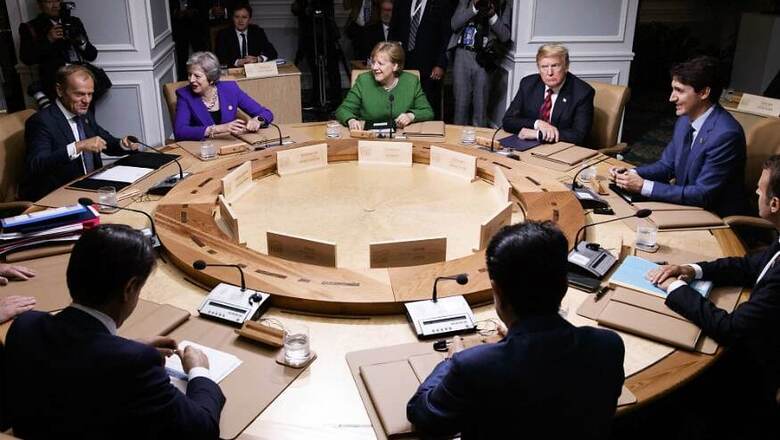
views
La Malbaie (Canada): President Donald Trump charged into the Group of Seven summit at odds with key allies over US tariffs, then set out to defuse tension with friendly banter and offered vague claims of progress in trade talks.
But details were scant and clear differences remained at the summit's midpoint.
After days of verbal sparring over new US tariffs on steel and aluminum imports, Trump joined the leaders of major industrialised nations in an idyllic Canadian resort town on Friday.
On his way to the annual gathering, Trump laid out his fundamental grievance, saying that other countries "have been taking advantage of the United States on trade."
He injected additional controversy by suggesting that the G-7 offer a seat at the table to Russia, which was ousted from the group after it annexed Crimea.
On Saturday, Trump was set to attend a breakfast focused on gender equality and a ceremonial scroll signing, before leaving the meeting several hours early, heading to Singapore for his summit with North Korea's Kim Jong Un, missing sessions on climate change, clean energy and ocean protection.
Trump's recent moves, building on 18 months of nationalist policy-making, leave him out of step with the globally-minded organization and have prompted speculation that the group could fracture into something more like the "G-6 plus one."
But in meetings with Canadian Prime Minister Justin Trudeau and French President Emmanuel Macron, Trump stressed his friendships with the allies while continuing to insist he wanted to see changes on trade.
Trump bantered easily with Trudeau, joking that the neighboring leader had "agreed to cut all tariffs and all trade barriers." And he emphasised a "good relationship" with Macron, saying they sometimes have a "little test" on trade, but predicting a positive outcome.
Still, the fundamental differences remained clear. Trump again railed against trade deficits with other countries and repeated that he may pursue separate trade deals with Canada and Mexico to replace the North American Free Trade Agreement, while Canada would prefer to renegotiate the three-way deal.
Asked if Trudeau was upset that Trump would be leaving the summit in Canada early on Saturday, Trump joked, "He's happy." Macron said he and Trump held "open and direct" discussions, adding that he thought there was a way to get a "win-win" outcome on trade, though details remained unclear.
Both sides suggested some progress in NAFTA talks. White House spokeswoman Sarah Huckabee Sanders said they were "close to a deal," but added that there was also discussion of shifting to a bilateral deal. A Canadian official said the leaders discussed accelerating the pace of the talks.
Trump spent the day participating in the rituals of the G-7, including the formal greeting by host Trudeau, a group photo in front of the sparkling St. Lawrence River and a working lunch of Arctic char and buckwheat salad.
Other members of the Group of Seven are Canada, France, Italy, Japan, Germany and Britain. The European Union also attends.
Trump's relations with the others have hit such a low point that a key question was whether the seven countries can agree on a joint statement of priorities at the conclusion of the meeting.
Macron said Thursday on Twitter, "The American President may not mind being isolated, but neither do we mind signing a 6 country agreement if need be." Trump said Friday he thinks the group will produce a joint statement.
Before arriving at the Quebec summit, Trump injected fresh drama by asking why Russia wasn't included in the group.
"They should let Russia come back in because we should have Russia at the negotiating table," he said.
Russia was ousted from the elite group in 2014 as punishment for President Vladimir Putin's annexation of Crimea and support for pro-Russian separatists in Ukraine.
In the US, special counsel Robert Mueller is investigating whether Trump's campaign colluded with Russia in a bid to sway the 2016 presidential election in his favour.
The comments drew a mixed response.
Canadian Foreign Minister Chrystia Freeland said the issue "hasn't been raised around the G-7 table," though she said there have been "some direct conversations in bilateral meetings." She added "there are no grounds whatsoever for bringing Russia with its current behaviour back into the G-7."
In Paris, Macron's office said such a move wouldn't make sense and pointed out that the latest country to impose economic sanctions on Russia was the US Italy's new premier, Giuseppe Conte, tweeted that he agreed with Trump, saying: "Russia should go back into the G-8. In the interest of all." Russia seemed unconcerned.
State news agencies quoted Kremlin spokesman Dmitry Peskov as saying, "We are putting the emphasis on other formats." Over the course of his presidency, Trump has inflamed allies with his isolationist policies, including withdrawing the US from the Paris climate accord and the international Iran-nuclear agreement.
"The rules-based international order is being challenged, not by the usual suspects but by its main architect and guarantor: the United States," said European Council President Donald Tusk.




















Comments
0 comment